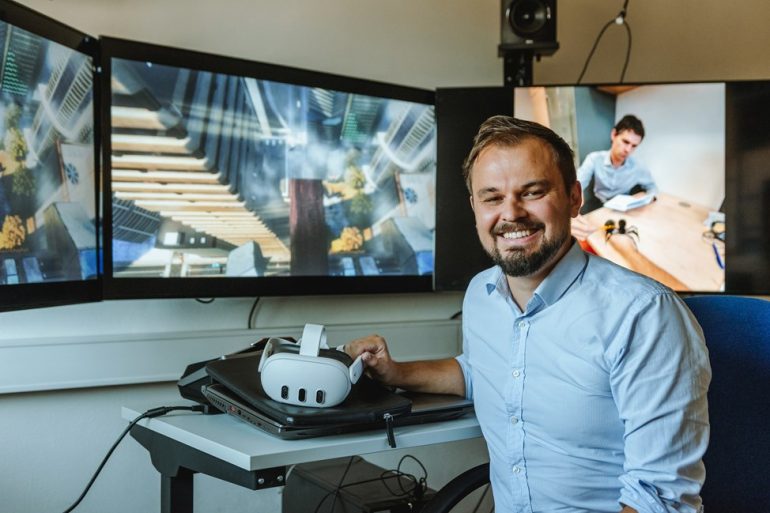A team of researchers from the Faculty of Arts of Masaryk University (FF MU) and the Brno University of Technology (BUT) have developed a virtual reality platform called BraveMind, which can be used to treat people suffering with phobias – crippling fears of objects, places or situations. The platform can provide a safe opportunity for phobia sufferers to Interact with fire, exotic spiders, or an entry into a dark subway or elevator, from the comfort of a psychotherapist’s office.
In July, the team’s phobia therapy technology found success in the prestigious Prototype and Verify competition, run by the South Moravian Innovation Center. Vojtěch Juřík from the FF MU Institute of Psychology, along with Oto Janoušek and Vratislav Čmiel, experts from the Institute of Biomedical Engineering of BUT’s Faculty of Electrical Engineering, received almost CZK 320,000 to complete their innovative prototype and verify the BraveMind tool.
A key element for the researchers is virtual or mixed reality and biosignal monitoring. According to Juřík, this combination of technologies is intended to facilitate courses of psychotherapy.
“The BraveMind therapeutic tool allows clients to safely respond to various phobic stimuli in a controlled environment,” explained Juřík, who provides psychological expertise in the project. “It will increase the effectiveness of therapy sessions and save the time and costs of psychotherapists.”
Cognitive behavioural therapy deals with the treatment of specific anxiety disorders. It uses different methods to deal with the phobia. The most effective of these is graded exposure therapy. The patient is gradually exposed to situations or objects towards which they feel fear, and this is where virtual and mixed reality combined with biosignal measurement is very effective.
“The added value of the BraveMind solution is the objective measurement of the client’s biosignal, which gives clear information about how intense an exposure the psychotherapist should choose at a given moment,” added Janoušek. He specified that in practice the product will take the form of classic glasses for virtual reality, which will be wirelessly connected to tools for biosignal measurement and visualisation.
The trio of experts is also assisted by psychotherapist Kateřina Bartošová, also from the Institute of Psychology at FF MU. She consults on the practical aspects of the tool and, as the chair of the Czech Society of Cognitive Behavioural Therapy, provides a professional guarantee and connection to the community of psychotherapists.
“Even in the initial phase, it is important for us to consult the development of the product with regard to knowledge from practice. And that needs to be done with someone who deals with it every day, which is why we value Kateřina so much,” Juřík pointed out.
The technical implementation of the new platform must be user-friendly, wireless, and must not require any installation. This is absolutely crucial, according to the research team. “In order for a product to survive the current competition on the market, the technical design must be essentially perfect from the user’s point of view – simple, functionally tuned, and clients must be comfortable using it so that they reach for it repeatedly,” said Čmiel. “We believe that in this respect we are ahead of other teams registered in the USA, for example, and we want to make the most of it.”
The users of the resulting product will be mainly psychologists. They can use BraveMind technology in their psychotherapy practice, but also in hospitals or schools. “The reach of our platform is great, because the number of people who are trying to actively take care of their mental health is increasing,” added Čmiel.
More than a billion people around the world suffer from phobias, and the idea of conducting psychotherapy in virtual reality has resonated with experts for decades. However, modern virtual reality technologies are now better, more accessible and cheaper.
“The increase in the use of virtual reality in various domains can be seen as a certain trend. Along with our BraveMind, several other projects of the same name have been created in recent months. So it is still a question of how we will continue to work with this name so that it is well distinguishable for end users,” said Juřík.
Currently, the researchers are waiting for fine-tuning of the hardware and software parts, the creation of a cloud solution for the collection of anonymous data, and the gradual verification of the product in practice.
“The first functional prototype should be created at the beginning of next year; immediately after that we would like to establish cooperation with psychotherapists, hospitals and centres, where we will deliver our platform free of charge and verify it with users. Then we are waiting for another tuning of the instrument. Only then can we offer BraveMind commercially,” said Juřík.
In the future, the team plans to expand the new technology in other directions. They say the tool also has diagnostic potential, and it is possible to further develop into the area focused on autonomous therapy regimens.
“We are thinking about the spectrum of possible clients, from counselling centres, to prevention methodologies, to primary and secondary schools,” said Juřík. “Time moves forward, people’s needs change. I can personally imagine a virtual space where therapists can meet their clients in different modes and look for the best way to conduct therapy – online, in virtual reality, in a mixed mode, and finally offline. All this with a well-prepared inventory of tools that we are developing.”







